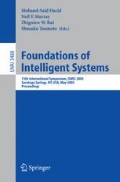Abstract
Deontic logic is appropriate to model a wide variety of legal arguments, however this logic suffers from certain paradoxes of which the so-called Chisholm paradox is one of the most notorious. We propose a formalisation of the Chisholm set in the framework of the situation calculus. We utilise this alternative to modal logic for formalising the obligations of the agent and avoiding the Chisholm paradox. This new approach makes use of the notion of obligation fluents together with their associated successor state axioms. Furthermore, some results about automated reasoning in the situation calculus can be applied in order to consider a tractable implementation.
Access this chapter
Tax calculation will be finalised at checkout
Purchases are for personal use only
Preview
Unable to display preview. Download preview PDF.
References
Chisholm, R.: Contrary-to-duty imperatives and deontic logic. Analysis 24, 33–36 (1963)
Reiter, R.: The frame problem in the situation calculus: a simple solution (sometimes) and a completeness result for goal regression. In: Lifschitz, V. (ed.) Artificial Intelligence and Mathematical Theory of Computation: Papers in Honor of John McCarthy, pp. 359–380. Academic Press, London (1991)
Pozos Parra, P., Nayak, A., Demolombe, R.: Theories of Intentions in the framework of Situation Calculus. In: Proc. of the Workshop on Declarative Agent Languages and Technologies at AAMAS, New York, USA (2004)
Demolombe, R., Herzig, A.: Obligation change in dependence logic and situation calculus. In: Workshop on Deontic Logic and Computer Science (2004)
Reiter, R.: Knowledge in Action: Logical Foundations for Specifying and Implementing Dynamical Systems. The MIT Press, Cambridge (2001)
Carmo, J., Jones, A.: Deontic logic and different levels of ideality. RRDMIST 1/95 (1995)
Carmo, J., Jones, A.: Deontic logic and contrary-to-duties. In: Handbook of Philosophical Logic, vol. 8. Kluwer, Dordrecht (2001)
Prakken, H., Sergot, M.: Contrary-to-duty obligations. Studia Logica 57, 91–115 (1996)
Author information
Authors and Affiliations
Editor information
Editors and Affiliations
Rights and permissions
Copyright information
© 2005 Springer-Verlag Berlin Heidelberg
About this paper
Cite this paper
Demolombe, R., Pozos-Parra, P. (2005). The Chisholm Paradox and the Situation Calculus. In: Hacid, MS., Murray, N.V., Raś, Z.W., Tsumoto, S. (eds) Foundations of Intelligent Systems. ISMIS 2005. Lecture Notes in Computer Science(), vol 3488. Springer, Berlin, Heidelberg. https://doi.org/10.1007/11425274_44
Download citation
DOI: https://doi.org/10.1007/11425274_44
Publisher Name: Springer, Berlin, Heidelberg
Print ISBN: 978-3-540-25878-0
Online ISBN: 978-3-540-31949-8
eBook Packages: Computer ScienceComputer Science (R0)

